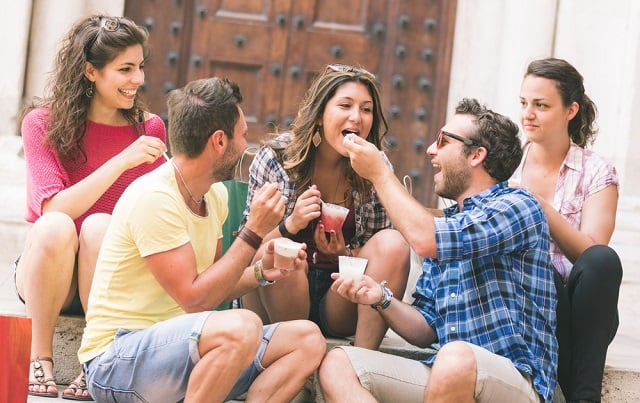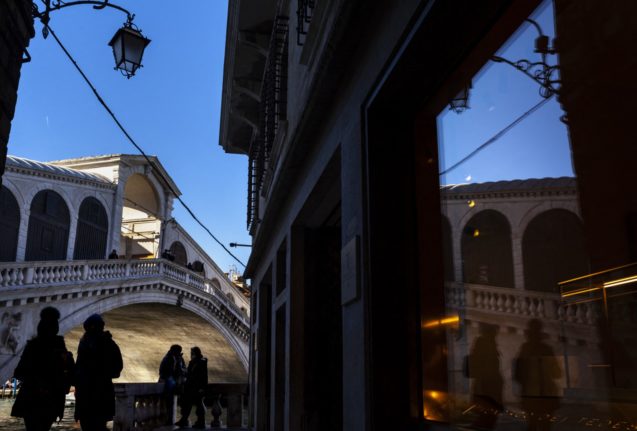Mayor Dario Nardella announced the initiative on Wednesday morning, and at lunchtime the first cleanings took place.
“From today, we'll be experimenting with a very simple measure: pouring water over the church steps to clean the spaces, and hopefully discourage people from eating, drinking and making a mess there,” Nardella told reporters.
“If tourists want to sit there, they'll get wet,” he said. “Florence is full of cafes with outdoor seating, tables, and benches. The churches aren't restaurants; they are religious and cultural sites.”
The first places to get the treatment were the areas by the Basilica of Santa Croce and Santo Spirito church. Nardella said that after the initial “experiment”, city authorities would evaluate whether the project should be extended to other areas, such as pavements.
 Tourists outside the Santa Croce basilica. Photo: Alberto Pizzoli/AFP
Tourists outside the Santa Croce basilica. Photo: Alberto Pizzoli/AFP
Some locals took to social media to criticize the move, with some complaining that it would deter tourists from the city or that it could be seen as elitist, in targeting those who choose to eat takeaway food rather than at pricey restaurants.
Others pointed out that in the current 30C heat, picnickers might not mind being showered with water.
#Nardella vuol bagnare i gradini delle chiese per impedire ai turisti di sedersi a mangiare. Orrore, la plebaglia che non va al ristorante.
— FrauFrau (@Stefy_1987) May 31, 2017
“Nardella wants to soak the steps of churches to stop tourists from sitting down to eat. What horror, the rabble that doesn't go to restaurants.”
In the afternoon, Nardella clarified the nature of the project, saying that the city would not be using “water cannons” on tourists, but simply cleaning church steps and pavements during lunchtime.
He further emphasized that the city was “in no way against tourists, but against those who do not respect Florence”.
Nardella ruled out the possibility of introducing fines against those who eat in historic areas – as is the case in Rome's recently restored Spanish Steps, for example, where those who flout the ban on picnicking have found themselves hit with hefty fines.
“We are using a kinder measure, but one we believe is just as effective,” he said.
The battle to protect Italy's ancient heritage from problems caused by mass tourism has become a hot topic over recent years.
READ MORE:
- Italy's holiday hotspots are struggling with too many tourists
- The tourist types you meet in Italy: Which one are you?
- Italy's quake-hit region fears tourism collapse
In Florence, food has been a key issue, and the city has passed regulations ordering new restaurants in the historic centre to sell only food which is at least 70 percent locally sourced.
Nardella also blocked an application from McDonald's to open a restaurant in the main square after a social media campaign by locals, a move which prompted the fast food chain to threaten legal action against the city.
The lagoon city of Venice in April introduced a slew of radical measures aimed at tackling overcrowding, from live people-counters to limits on tourist accommodation and promotion of lesser-explored areas. Two weeks later, the council also banned any new takeaway food shops from opening in the historic centre, in a bid at cutting down on littering. Only artisanal gelaterias were exempt from the ban.



 Please whitelist us to continue reading.
Please whitelist us to continue reading.
Member comments